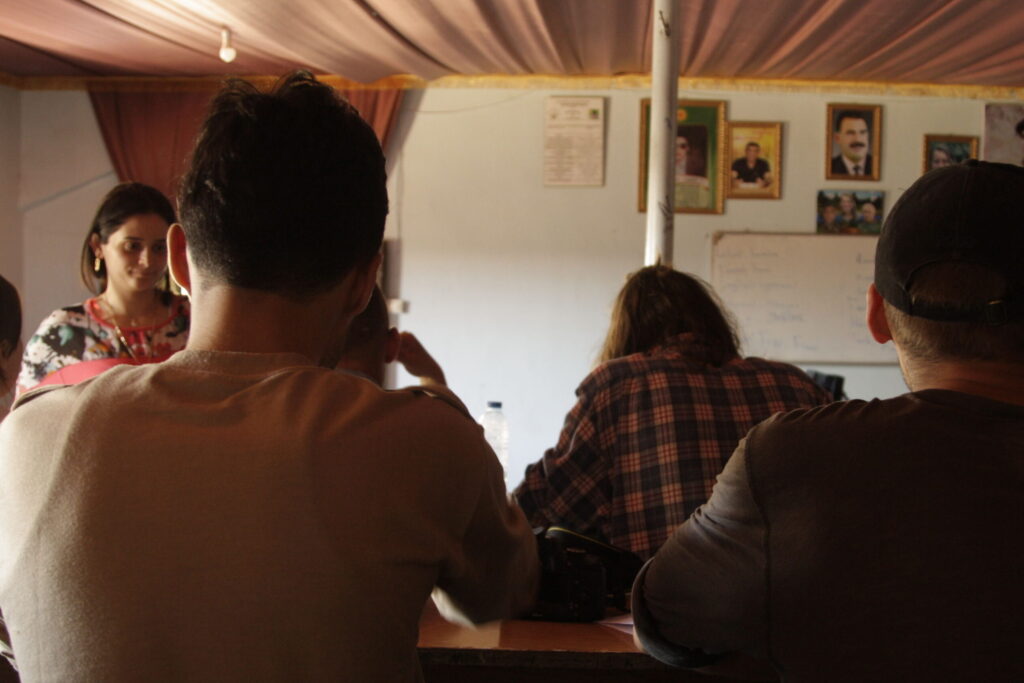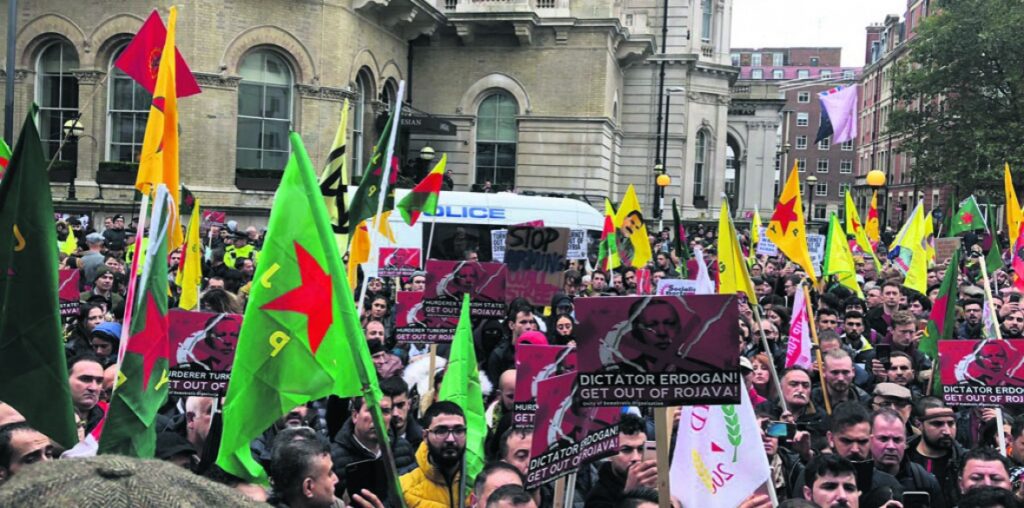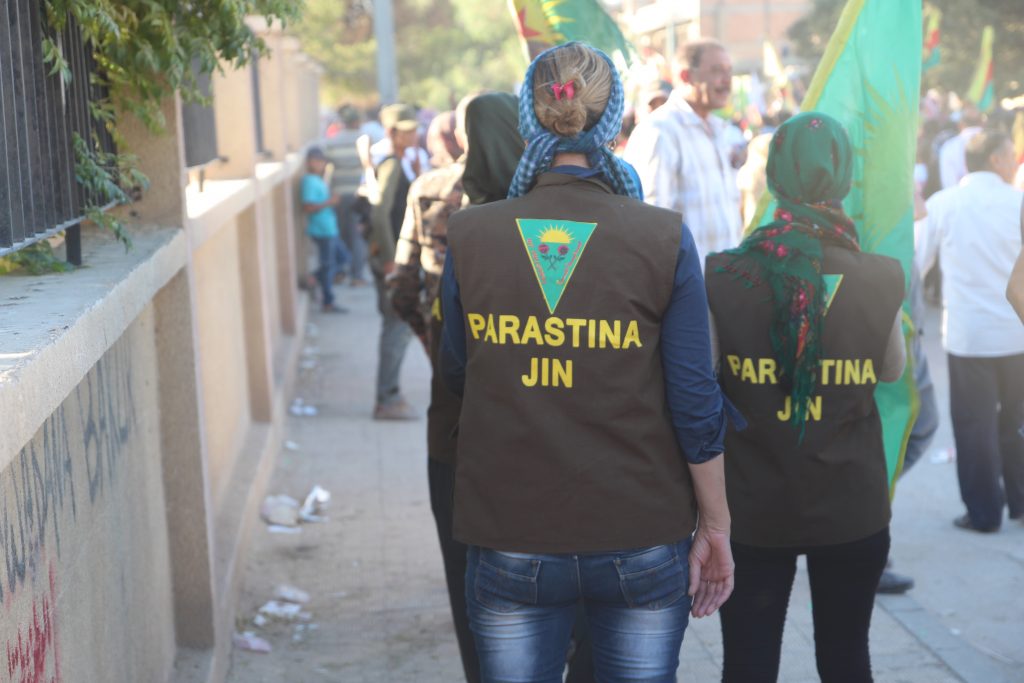About Us
We, as internationalists from the Middle East, Asia, Africa, Europa, America and Oceania, have been working in different structures of the revolution in Rojava and Northern Syria for many years. Though we come from different political backgrounds, the Kurdish movement united and inspired us with a new revolutionary perspective going far beyond the Middle East.
In the beginning of 2017 we started to organise the Internationalist Commune of Rojava as a self-organized collective, working in coordination with the youth movement of Rojava (YCR). Until then, the internationalists working in Rojava were different people, from different countries, doing different things. But since that time we have been continuing with our works in a more organized way. We wanted to remake the internationalist face of this revolution and facilitate the participation of other internationalists.
We have completed the construction of the Sehid Helen Qerecox Internationalist Academy, and recently held our first education for a group of new internationalists from across the globe. Here is a report about the education and our first year of work at the Commune. In the beginning of this year, we started the campaign “Make Rojava Green Again” together with the responsible entities within the self-administration for the ecological work. Several initial ecological projects, mainly the creation of a tree nursery, are in progress and we will be publishing a book about these works in the coming months.
Members of the commune are working in different structures of the society, learning what this revolution means for the people and for the society. You can find out more about this work here. If you’re interested in joining us at the Commune, you can find more information here. You can also read on below to learn about our three guiding principles: Learn, Support, Organize.
Learn
Since the historical resistance against Daesh in Kobane, the revolution in Rojava is inspiring revolutionaries from all over the world. Many want to take part in it and learn from the experiences of the movement here. In order to give a meaningful contribution, it is important to understand the dynamics of Rojava. Without knowing the history, culture and mentality of the region, our view on Rojava will always remain an outsider’s perspective. Education is the key to understanding and practice.
Our education focuses on history, culture and ethics. Another main aspect is learning the languages of the societies we live in. Without knowing one of the local languages it is hard to feel and understand the social processes and contradictions in this revolution. Speaking a local language is more than just the technical ability to communicate – if you want to truly become part of the collective structures here, rather than remaining a mere outside observer or tourist, you will have to learn Kurdish, Arabic or Syriac.
Support
Despite the military achievements against Isis as well as the stabilization and expansion of the revolution in northern Syria, the democratic self-administration remains under pressure. Turkey’s murderous assault on Afrin is an ongoing reminder of the colossal efforts our international enemies are pouring into destroying the revolution.
Besieged by hegemonic ambitions and violent threats, Rojava has to spend most of its resources on its defense. The embargo against the people of Rojava creates a lack of many things, but in particular people with specific skills – medical personnel, engineers, language teachers and translators. On the other hand, we need more than just experts – we are looking for committed people with ideals.
We are neither an NGO and nor are we tourists. We are not trying to “teach” the people of Rojava how to carry out a revolution, and nor do we plan to import European leftist subculture to Rojava. Our work is not about creating fancy projects for our personal development. We are working hand in hand and step by step with local structures to develop a better and direct way to support the revolution.
The ‘Make Rojava Green Again’ campaign is just one concrete example – we have spent many months learning together with the local environmental committees, and members of the commune work in a local tree nursery every day as we prepare our reforestation together. By integrating ourselves into the local culture and society we aim to become a meaningful part of the revolution.
Organize
The struggle for the liberation of women, as well as for an ecological and democratic society, will not be limited to Northern Syria. Internationalism is mutual support in the fight against capitalist modernity, the hegemonic force uniting the nation-state, capitalism and industrialism. Bringing the struggle of the people in Rojava to our societies elsewhere across the globe is one of the most significant contribution to the revolution.
Supporting the revolution does not mean coming for a visit or sending a single donation. It means organizing the revolution where you are, and being connected to your local struggles. Revolution does not happen by itself, neither in Rojava nor elsewhere. Revolution has to be organized. This requires will, discussion, experiences, inspiration and a touch of madness – if not in Rojava, where should this practical change start?
About Us
We, as internationalists from the Middle East, Asia, Africa, Europa, America and Oceania, have been working in different structures of the revolution in Rojava and Northern Syria for many years. Though we come from different political backgrounds, the Kurdish movement united and inspired us with a new revolutionary perspective going far beyond the Middle East.
In the beginning of 2017 we started to organise the Internationalist Commune of Rojava as a self-organized collective, working in coordination with the youth movement of Rojava (YCR). Until then, the internationalists working in Rojava were different people, from different countries, doing different things. But since that time we have been continuing with our works in a more organized way. We wanted to remake the internationalist face of this revolution and facilitate the participation of other internationalists.
We have completed the construction of the Sehid Helen Qerecox Internationalist Academy, and recently held our first education for a group of new internationalists from across the globe. Here is a report about the education and our first year of work at the Commune. In the beginning of this year, we started the campaign “Make Rojava Green Again” together with the responsible entities within the self-administration for the ecological work. Several initial ecological projects, mainly the creation of a tree nursery, are in progress and we will be publishing a book about these works in the coming months.
Members of the commune are working in different structures of the society, learning what this revolution means for the people and for the society. You can find out more about this work here. If you’re interested in joining us at the Commune, you can find more information here. You can also read on below to learn about our three guiding principles: Learn, Support, Organize.
Learn

Since the historical resistance against Daesh in Kobane, the revolution in Rojava is inspiring revolutionaries from all over the world. Many want to take part in it and learn from the experiences of the movement here. In order to give a meaningful contribution, it is important to understand the dynamics of Rojava. Without knowing the history, culture and mentality of the region, our view on Rojava will always remain an outsider’s perspective. Education is the key to understanding and practice.
Our education focuses on history, culture and ethics. Another main aspect is learning the languages of the societies we live in. Without knowing one of the local languages it is hard to feel and understand the social processes and contradictions in this revolution. Speaking a local language is more than just the technical ability to communicate – if you want to truly become part of the collective structures here, rather than remaining a mere outside observer or tourist, you will have to learn Kurdish, Arabic or Syriac.
Support

Despite the military achievements against Isis as well as the stabilization and expansion of the revolution in northern Syria, the democratic self-administration remains under pressure. Turkey’s murderous assault on Afrin is an ongoing reminder of the colossal efforts our international enemies are pouring into destroying the revolution.
Besieged by hegemonic ambitions and violent threats, Rojava has to spend most of its resources on its defense. The embargo against the people of Rojava creates a lack of many things, but in particular people with specific skills – medical personnel, engineers, language teachers and translators. On the other hand, we need more than just experts – we are looking for committed people with ideals.
We are neither an NGO and nor are we tourists. We are not trying to “teach” the people of Rojava how to carry out a revolution, and nor do we plan to import European leftist subculture to Rojava. Our work is not about creating fancy projects for our personal development. We are working hand in hand and step by step with local structures to develop a better and direct way to support the revolution.
The ‘Make Rojava Green Again’ campaign is just one concrete example – we have spent many months learning together with the local environmental committees, and members of the commune work in a local tree nursery every day as we prepare our reforestation together. By integrating ourselves into the local culture and society we aim to become a meaningful part of the revolution.
Organize

The struggle for the liberation of women, as well as for an ecological and democratic society, will not be limited to Northern Syria. Internationalism is mutual support in the fight against capitalist modernity, the hegemonic force uniting the nation-state, capitalism and industrialism. Bringing the struggle of the people in Rojava to our societies elsewhere across the globe is one of the most significant contribution to the revolution.
Supporting the revolution does not mean coming for a visit or sending a single donation. It means organizing the revolution where you are, and being connected to your local struggles. Revolution does not happen by itself, neither in Rojava nor elsewhere. Revolution has to be organized. This requires will, discussion, experiences, inspiration and a touch of madness – if not in Rojava, where should this practical change start?